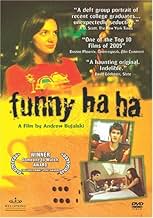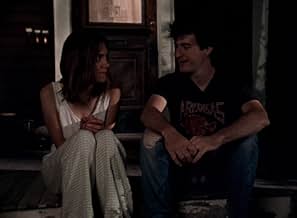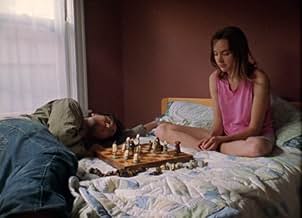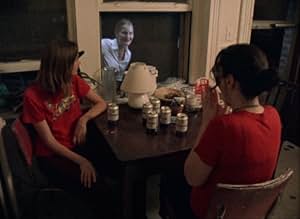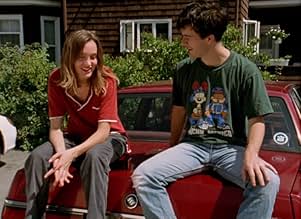AVALIAÇÃO DA IMDb
6,4/10
3,1 mil
SUA AVALIAÇÃO
Adicionar um enredo no seu idiomaMarnie just graduated from college, drinks likes she's still in school, and is looking for a temporary job but a permanent boyfriend. She loves a guy who doesn't love her (?), ping-pongs bet... Ler tudoMarnie just graduated from college, drinks likes she's still in school, and is looking for a temporary job but a permanent boyfriend. She loves a guy who doesn't love her (?), ping-pongs between awkward romantic alternatives and even less suitable jobs.Marnie just graduated from college, drinks likes she's still in school, and is looking for a temporary job but a permanent boyfriend. She loves a guy who doesn't love her (?), ping-pongs between awkward romantic alternatives and even less suitable jobs.
- Prêmios
- 2 vitórias e 3 indicações no total
Avaliações em destaque
Looking like a documentary, this movie captures well life at the age of the characters, that I remember when I was that age: direction-less and insecure. The problem is, a glimpse into people's personal lives aren't necessarily interesting, and I wanted more to happen or for the story to be more interesting. I also wondered why characters we saw a lot of in the beginning of the movie, simply disappeared with no explanation. Alex's unexpected marriage was never explained, nor did Marnie seem to try to find out how this marriage came about. In keeping with the theme of a segment of someone's life snipped out randomly and put on film, the ending provided no resolution to anything, but I felt it could have been less abrupt and arbitrary.
First time filmmaker Andrew Bujalski's extremely low-budget feature "Funny Ha Ha" has many of the hallmarks of an early John Cassavetes film: grainy camera-work, minimalist storytelling, and naturalistic, ad lib performances.
Bujalski's cast of characters is made up entirely of white urban youth in their early to mid 20's - that awkward period in life after an individual has finished college yet before he has moved on to building his own career and family. Given what appears to be their first real taste of freedom and independence, the characters do little but sit around, get drunk, and talk about their romantic relationships, but Bujalski observes all this without hysteria and judgment, thereby lending the film the aura of real life being caught on film. The focal point is an attractive young woman named Marnie (Kate Dollenmayer) who drinks a bit too much, seems vaguely directionless and lacking in energy, and is somewhat inexperienced in the ways of love, but who, nevertheless, seems reasonably well grounded and knows her own limits as a person.
"Funny Ha Ha," despite its occasional raggedness and self-indulgence, is blessedly free of contrivance and melodramatics. These may not be the most goal-oriented or socially-conscious youth we've ever encountered in the movies, but neither are they the most troubled or self-destructive. They seem like pretty ordinary kids living in the moment and only vaguely aware that there's a world outside of themselves that they are destined to become a part of in the very near future.
The beauty of the dialogue rests in its ability to capture with uncanny accuracy the way people in the real world actually speak. The characters interact in ways that are genuine and believable, and life just seems to be unfolding as we watch it on screen. This is due in small measure to the fine performances from a cast of virtual unknowns who know how to appear relaxed, honest and natural in front of the camera.
With its improvisational and off-the-cuff film-making style and its abrupt, the-camera-just-ran-out-of-film ending, "Funny Ha Ha" makes us feel as if we are eavesdropping on the daily lives of a handful of relative strangers. Lucky for us, they turn out to be people in whom we can see something of ourselves reflected, and with whom we enjoy spending our time.
Bujalski's cast of characters is made up entirely of white urban youth in their early to mid 20's - that awkward period in life after an individual has finished college yet before he has moved on to building his own career and family. Given what appears to be their first real taste of freedom and independence, the characters do little but sit around, get drunk, and talk about their romantic relationships, but Bujalski observes all this without hysteria and judgment, thereby lending the film the aura of real life being caught on film. The focal point is an attractive young woman named Marnie (Kate Dollenmayer) who drinks a bit too much, seems vaguely directionless and lacking in energy, and is somewhat inexperienced in the ways of love, but who, nevertheless, seems reasonably well grounded and knows her own limits as a person.
"Funny Ha Ha," despite its occasional raggedness and self-indulgence, is blessedly free of contrivance and melodramatics. These may not be the most goal-oriented or socially-conscious youth we've ever encountered in the movies, but neither are they the most troubled or self-destructive. They seem like pretty ordinary kids living in the moment and only vaguely aware that there's a world outside of themselves that they are destined to become a part of in the very near future.
The beauty of the dialogue rests in its ability to capture with uncanny accuracy the way people in the real world actually speak. The characters interact in ways that are genuine and believable, and life just seems to be unfolding as we watch it on screen. This is due in small measure to the fine performances from a cast of virtual unknowns who know how to appear relaxed, honest and natural in front of the camera.
With its improvisational and off-the-cuff film-making style and its abrupt, the-camera-just-ran-out-of-film ending, "Funny Ha Ha" makes us feel as if we are eavesdropping on the daily lives of a handful of relative strangers. Lucky for us, they turn out to be people in whom we can see something of ourselves reflected, and with whom we enjoy spending our time.
Very slooooow... You'll probably have a couple of smiles but you won't be able to stop checking your watch and wondering when it is going to end. Don't waste your time unless you're really deep into independent movies.
This seemed to be just the kind of movie I enjoy, but turned out to be a shell of the same.
The director gets some things right, like his choice of star and some of the scene pacing. Dialog and character interactions breathe properly; they're languid and yet vaporous, as some other reviewers have said.
Too bad they all come to nothing. Marnie's a vacuous amalgam, not a character; she's the camera, not a human being. Encounters and relationships don't build through sequence or consequence; almost nothing happens that informs or affects a subsequent scene. Through her, we see the other characters, who are almost universally portrayed by much lesser actors. There's no character arc; the script feels self-indulgent and ultimately trivial. The entire movie is Marnie amused, Marnie bemused, Marnie bored... audience bored.
Bujalski had the pieces to make a remarkable film, but instead he never got the transmission out of neutral.
The director gets some things right, like his choice of star and some of the scene pacing. Dialog and character interactions breathe properly; they're languid and yet vaporous, as some other reviewers have said.
Too bad they all come to nothing. Marnie's a vacuous amalgam, not a character; she's the camera, not a human being. Encounters and relationships don't build through sequence or consequence; almost nothing happens that informs or affects a subsequent scene. Through her, we see the other characters, who are almost universally portrayed by much lesser actors. There's no character arc; the script feels self-indulgent and ultimately trivial. The entire movie is Marnie amused, Marnie bemused, Marnie bored... audience bored.
Bujalski had the pieces to make a remarkable film, but instead he never got the transmission out of neutral.
Sitting through this movie is just like the tedium of actually trying to find a date in Boston. This movie, much like most of the city of Boston is populated by men who can't find a date and the women who don't want to date them. So OK, the director basically held a mirror up to my early 20's when I was that underemployed guy sleeping on the floor on a foam pad with my girlfriend in that little Queensbury Street studio apartment. So OK it really is not a very forgiving city when you're single and lonely. Unfortunately in this film there is no real story worth caring about. Some shallow people do shallow things hoping no one notices how shallow they are by punctuating every movement with witty pseudo-intellectualism. Again, just like living in Boston. So for that I applaud the director. He really captured the Hub at its grittiest. That and the film is so refreshingly free of production values. It's like looking at old home movies of people you once cared about but have since outgrown.
Você sabia?
- CuriosidadesIt is considered the first 'mumblecore' movie.
- ConexõesFeatured in The 2004 IFP/West Independent Spirit Awards (2004)
- Trilhas sonorasMal De Mer
Written and performed by Matty & Mossy
Principais escolhas
Faça login para avaliar e ver a lista de recomendações personalizadas
- How long is Funny Ha Ha?Fornecido pela Alexa
Detalhes
- Data de lançamento
- País de origem
- Central de atendimento oficial
- Idioma
- Também conhecido como
- Смешно, ха-ха
- Locações de filme
- 1302 Commonwealth Ave., Allston, Massachusetts, EUA(pay phone location)
- Empresas de produção
- Consulte mais créditos da empresa na IMDbPro
Bilheteria
- Faturamento bruto nos EUA e Canadá
- US$ 77.070
- Fim de semana de estreia nos EUA e Canadá
- US$ 10.555
- 1 de mai. de 2005
- Faturamento bruto mundial
- US$ 88.078
- Tempo de duração1 hora 29 minutos
- Cor
- Proporção
- 1.37 : 1
Contribua para esta página
Sugerir uma alteração ou adicionar conteúdo ausente



